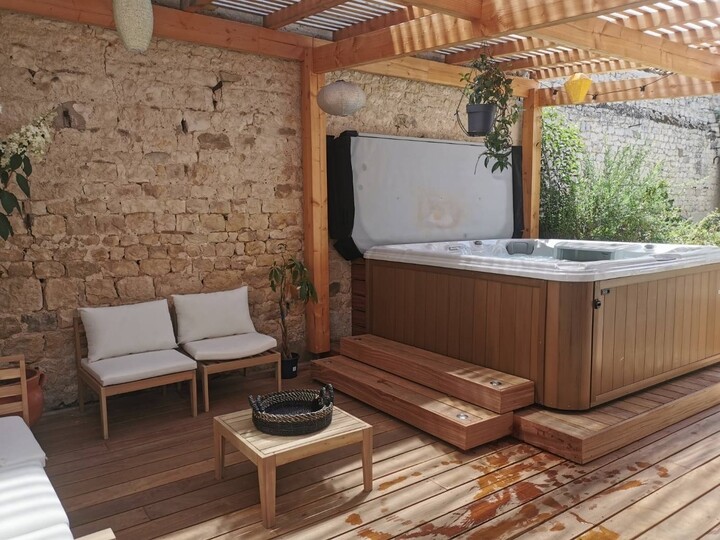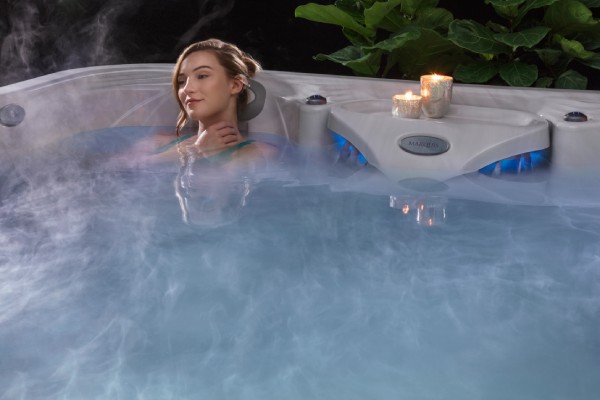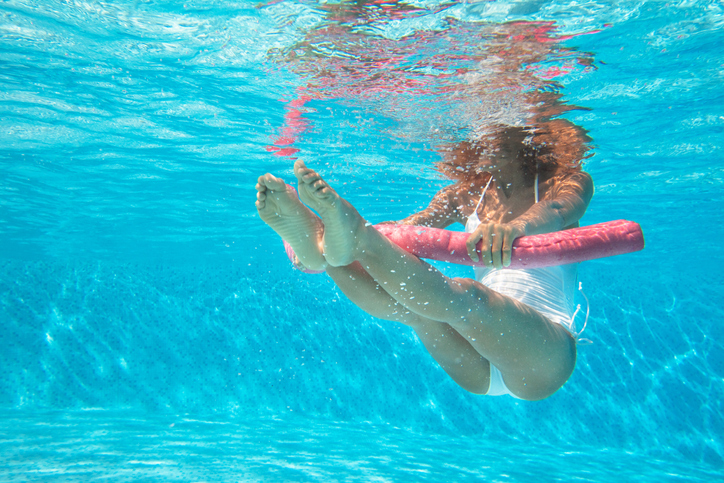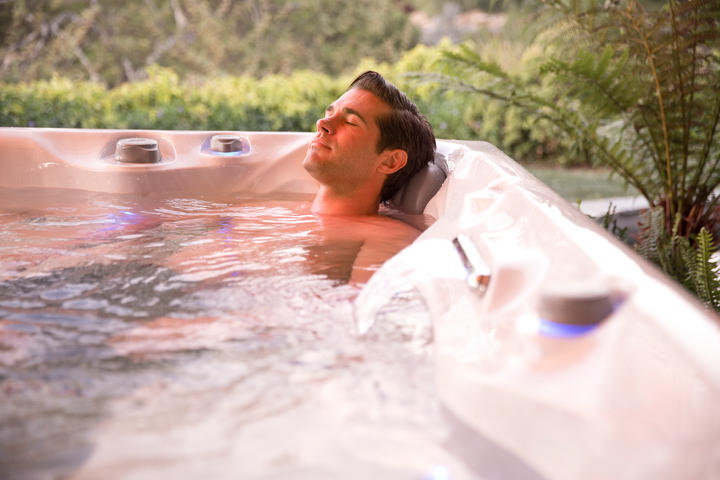If you’ve considered buying a pool anytime in the last decade, you’ve likely been curious about saltwater systems.
With saltwater pools becoming more popular than ever, it often leaves people with one big choice when investing in a pool.
Chlorine or saltwater?
The disadvantages of saltwater pools have been a growing topic of discussion, and it’s important to be well-informed prior to selecting this water system.
If you’re in the market for a pool and are trying to narrow down which water system is best for your lifestyle, keep reading.
In this article, we’ll be discussing the advantages and disadvantages of saltwater pools and how they compare to chlorine systems.
Let’s get started.
How Do Saltwater Pools Work
Before we can dive into the common struggles people have with saltwater pools, it’s important to understand how this system works.
Many people are under the impression that saltwater pools are chlorine-free, which is often what sells them on this system.
The reality is saltwater systems still produce chlorinated water.
Saltwater pools use a process called electrolysis to keep the water clean. Essentially, as your water moves through the salt cells in your electrolytic chlorine generator, the salt is broken down, producing chlorine to treat the water.
This chlorine disinfects your pool water much like traditional chlorine would, however, it produces far fewer chloramines. This is the byproduct of chlorine that gives pools the harsh chemical scent that often comes to mind when you think of public pools.
You may be wondering why people would opt for a saltwater system if it still has chlorine, and the reality is there are many reasons why this happens.
The Advantages of Saltwater Pools
Choosing a saltwater system will heavily depend on your lifestyle and personal preference.
These types of systems were traditionally only used at spa resorts. However, they’ve become an appealing option for many over the last decade or so.
While many assume these pools are like swimming in the ocean, their water isn’t nearly as salty, making it more gentle on your body.
That’s a big benefit of saltwater pools, but there are a few other aspects that make them a notable contender in the pool industry.
1. No Strong Chlorine Smell
As mentioned above, saltwater pools produce far fewer chloramines than traditional chlorine pools.
Chloramines are the byproduct of chlorine as it treats your water and is the main culprit in making pools smell like chlorine.
Have you ever been to a community pool and noticed the suffocating chlorine smell? That smell is from the chloramines, and how strong it is, directly correlates to the amount of chlorine that’s been added to the water. That’s why public pools always have such a strong smell to them!
Because saltwater pools produce lower levels of chlorine, there are fewer chloramines, resulting in a much more pleasant-smelling pool!
2. Easier to Maintain
With traditional chlorine pools, you’re adding chlorine once or twice a month to keep your water clean.
One of the benefits of saltwater pools is that they don’t require salt to be added as frequently.
When you first open your saltwater pool for the season, you’ll add a significant amount of salt to the water to bring the levels up into the proper range. After the initial treatment, you may only need to add small amounts of additional salt one or two more times throughout the entire swimming season.
Additionally, your water will be easier to maintain and require less work due to its ability to keep your chlorine levels at a consistent level.
In a traditional pool, your chlorine levels will fluctuate throughout the week, leading you to more regular treatments to maintain your water and keep your chlorine levels within a safe range.
With saltwater pools, the generator maintains the chlorine levels of your water for you, keeping them at a consistent level throughout the entire swimming season.
This makes caring for your water easier and less time-consuming, removing the need to check your chlorine levels every two or three days like you would with a chlorine pool.
3. Lower Maintenance Costs
Saltwater pools continually release the appropriate amount of chlorine into your water, ensuring it’s always clean and ready to use.
Throughout the swimming season, you’ll need to occasionally add salt to your generator, and it’ll do the rest. As previously mentioned, this only happens a few times throughout the season.
Chlorine pools, however, require regular treatments to maintain their cleanliness, typically once or twice a week.With this increase in treatments, chlorine pools generally cost more to maintain than saltwater pools.
Additionally, chlorine is typically more costly than salt, lowering your operational costs even further.
4. More Gentle on Skin, Eyes, and Hair
Unlike chlorine, saltwater pools don’t leave you with red, stinging eyes after an afternoon swim.
Saltwater is softer than chemically treated water, which can make it feel smooth as it moves across your skin. This helps ensure you aren’t left with tight, dry skin that feels dehydrated or brittle hair that’s been stripped of all its natural oils after you climb out of the water.
Salt helps soften water, giving you an all-around gentler swim.
To make them even more appealing, saltwater doesn’t strip colors out of swimwear, ensuring your suits will last much longer than they would when subjected to a traditional chlorine pool.
Disadvantages of Saltwater Pools
While saltwater pools can provide a number of alluring benefits, there are also some disadvantages that may have you reconsidering opting for this style of pool.
Before settling on a saltwater pool, here are three things you should consider.
1. Expensive Up-Front Costs
While the regular maintenance cost of saltwater pools will save you money long-term, these pools have a higher initial price tag than chlorine pools, making them a larger investment at the start.
Because saltwater pools require a specialized generator and require cells to be added to it, you’ll be facing some higher start-up costs that may make it outside your starting budget.
These generators can cost up to $1500, while the salt cells can range between $300-$600 and need to be replaced once every five or six years.
Above that, you’ll need a significant amount of salt when first starting up your pool each year, which amps up the initial cost of your pool as well.
2. Salt is Corrosive
Salt is well known for its corrosive properties, and when used in a pool, it can cause damage over time.
Salt will damage anything in or around your pool that’s metal. This means your water will slowly deteriorate key aspects of your pool over time, such as:
- Ladders
- Handrails
- Pump Seals
- Lights
- Patio Furniture
- Outdoor Grills
To minimize corrosion when choosing a saltwater pool, opt for pool items that are designed specifically for these types of systems.
Vinyl pools are especially susceptible to corrosion as they usually have metal wall panels. If you’ve chosen a saltwater system, a fiberglass pool is your best option.
Additionally, saltwater can stain your patio stones or your deck. As water inevitably splashes on your pools surrounding stones, you can be left with large stains that cause discoloration.
The great news is this can be easily avoided by sealing your deck or patio stones to protect them from the saltwater.
3. Requires More Expertise
Saltwater pools are designed using more complex components, which not every pool technician will be able to work with.
Often, when you need your pool serviced or repaired, you’ll have to find an experienced, or specialized repair technician to take on the job. This could lead to higher repair costs and a more challenging time finding the right technician.
If you hire someone who’s inexperienced in dealing with saltwater systems, you’ll be at a higher risk of bigger issues forming, faulty repairs, or incomplete diagnostics, leaving you with issues being missed.
Should You Get a Saltwater Pool?
Deciding between a chlorine pool and a saltwater pool is a decision that can be influenced by various factors, and it’s a personal choice only you can make.
Before deciding on a saltwater system, it’s important to consider your:
- Lifestyle
- Sensitivities
- Budget
- Existing backyard space
One of the most influential factors of your water system will be your budget, and with saltwater pools having a significantly higher price range, this may be what leads you to settle for another style of pool.
Whatever you decide, if you do your research, you should find endless joy in your new pool!
Shop For Pools in New Jersey
Whether you’re looking for an expert pool technician, a pool installation, or a pool removal service, our team at National Pools & Spas can help.
With four locations throughout New Jersey, we make pool care easy and convenient without compromising the quality of your experience. Creating your dream backyard space is our passion, and we love seeing our customers find the perfect pool to elevate their homes.
If you’re ready to explore your pool options and upgrade your backyard fun, contact our team of experts or visit your local showroom today!





